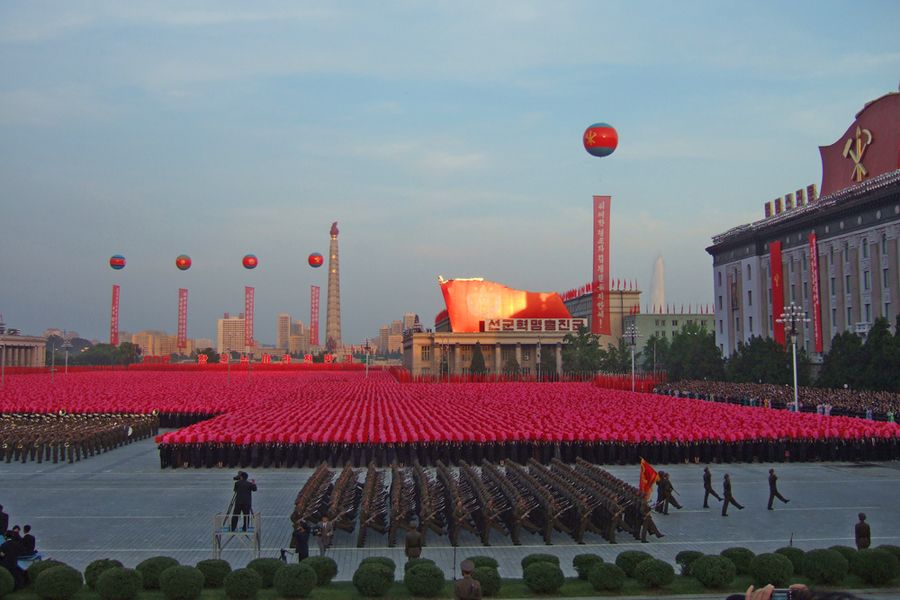Why Should We Worry About North Korea?

North Korea’s leader Kim Jong Un could be bluffing. He could be talking about attacking South Korea as a way of keeping himself in power, or proving to his people and his neighbors that he is in command rather than his generals.
But what if he isn’t? What if an attack did occur? What would it look like?
Many military experts look at tensions on the Korean Peninsula like a real-life game of Risk. Each side has armies, aircraft and missiles lined up to defend each other even though the two sides aren’t exactly equal. The North has 1.2 million soldiers in uniform, including 200,000 special forces units. It also has long-range missiles capable of reaching all of South Korea, plus Japan and Guam.
PHOTOS: North Korea's History of Saber-Rattling
The South has only half that number of troops, but possesses more modern equipment, training and technology. Much of it has been provided by the United States, which also has a permanent deployment of 30,000 Army units and about 60 F-16 jet fighters in South Korea.
So what would conflict on the Korean Peninsula look like? Bruce Bennett, a senior analyst at the Rand Corporation, says it could start with a simple failure to communicate.
“The big concern is some kind of mistake,” Bennett said. “A miscalculation by the regime or a mistake by a local commander could cause an armed provocation that would provoke a response and then you get that spiral.”
Sign up for the Live Science daily newsletter now
Get the world’s most fascinating discoveries delivered straight to your inbox.
Bennett points to the April 2010 shelling of a South Korean island by North Korean artillery batteries, or the sinking of a South Korean gunboat that killed 46 South Korean sailors. Those moves were supposed to demoralize the South Korean populace, but actually did the opposite. Since then, public opinion has pushed South Korean leaders to take a firmer hand with any kind of North Korean action.
NEWS: North Korea Nuclear Strike on U.S. Unlikely
Any repeat of these past incidents could be the spark that ignites war. And what if Kim decided for a more direct attack on the South? The North currently has artillery units within range of the capital of the South.
“There are thousands of rockets that could be fired with each launch,” Bennett said. “That could involve hundreds of kilograms of high explosives. There are a couple thousand tubes that could reach the northern parts of Seoul. That could be devastating and very bloody.”
Bennett noted that North Korea possesses several wild cards in this conflict as well: chemical, biological and nuclear weapons. He said that Pyongyang has all three, but the extent and potency of each is not well known by western military analysts.
A massive ground invasion by the North might look good on paper, but could falter pretty quickly, according to Gregory Koblenz, a Stanton nuclear security fellow at the Council on Foreign Relations.
That’s because North Korea lacks the massive logistical support (and gasoline) that modern armies need.
“Can they actually drive all these vehicles from the North to Seoul? That is an open question,” Koblenz said.
NEWS: War or Peace May Doom Korean DMZ Wildlife
And how does the United States figure into this high-stakes game? Koblenz said that U.S. military officials have decided to back off further aggressive moves for the time being -- moves such as flying B-2 bombers from Missouri to the Korean peninsula or adding more fighter jets to its arsenal. Any move by North Korea will be checked by a joint move by the U.S. and South Korea.
“If a North Korean act is large scale, that might put more pressure on the U.S. to proceed directly with an action,” Koblenz said. “The only way the U.S. Navy or Air Force could go after North Korea would be in very close coordination with the South Koreans.”
One analyst says he believes the confrontations could continue until Kim feels secure in his post as leader of the country. John Park says the cycle of provocation and rhetoric, followed by an easing, has repeated several times except for a few big differences.
“It seems like the cycle is geared to writing a new chapter,” said Park, a security fellow at the Massachusetts Institute of Technology and U.S. Institute of Peace. “Kim Jung Un is new on scene. Part of what is happening is his effort to calibrate and observe the where the new leaders flinch.”
Park notes that unlike 2010, local military commanders in South Korea have been given authorization to respond more quickly and with more independence to any provocation by the North.
“The biggest difference has been the change of guidance of South Korean president to the military,” Park said. The South Koreans are saying if you attack us we will take out the North Korean military high command. And what’s been added is that (South Korean) President Pak stated that military commanders should feel free to retaliate immediately.”
This story was provided by Discovery News.











